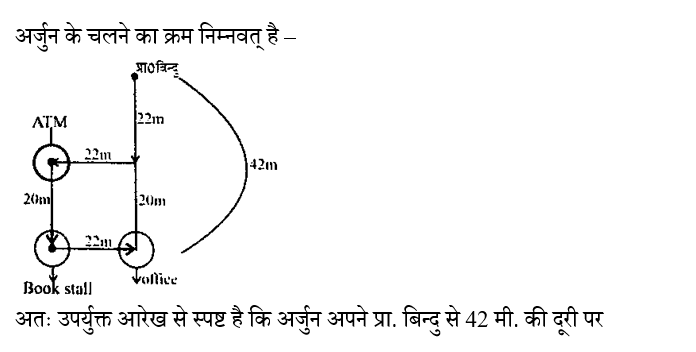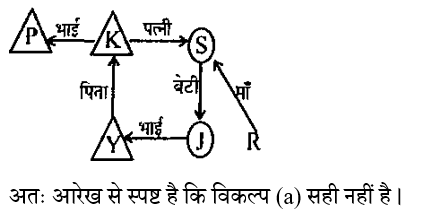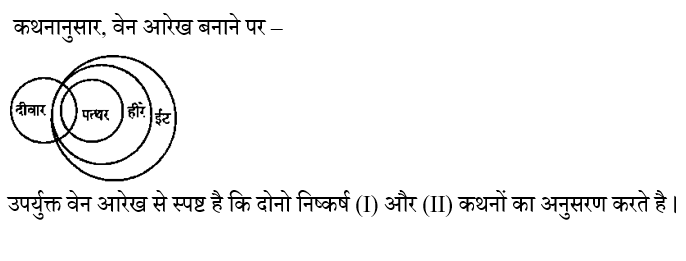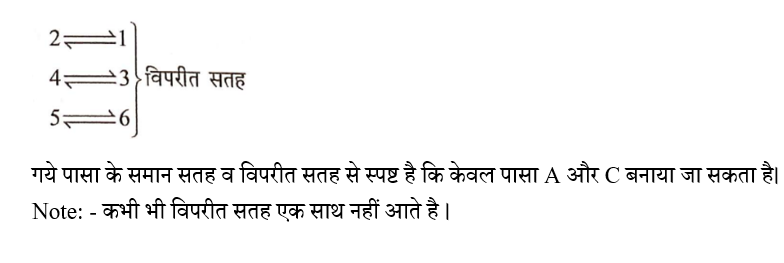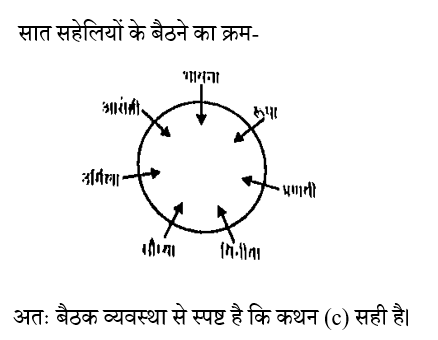Question 1:
Select the set in which the numbers are related in the same way as the numbers of the given set are related with each other.
उस समुच्चय का चयन करें जिसमें संख्याएँ उसी प्रकार संबंधित हैं जिस प्रकार दिए गए समुच्चय की संख्याएँ एक दूसरे के साथ संबंधित हैं।
(Note: Mathematical operations should be performed on whole numbers only, without breaking the number into its constituent digits. E.g. 13 – Mathematical operations like addition/ subtraction/multiplying by 13 can be performed on 13. Breaking 13 into 1 and 3 and then performing mathematical operations on 1 and 3 is not allowed.)
(नोट : संख्याओं को उसके घटक अंकों में विभाजित किए बिना, पूर्ण संख्याओं पर ही गणितीय संक्रियाएँ की जानी चाहिए। जैसे 13 - मान लीजिए 13 पर गणितीय संक्रियाएँ जैसे कि 13 में जोड़ना / घटाना / गुणा करना आदि किया जा सकता है। 13 को 1 और 3 में तोड़कर और फिर 1 और 3 पर गणितीय संक्रियाएँ करने की अनुमति नहीं है )
(361, 49, 266) (225, 36, 180)
Question 2:
Arjun walks 22 m towards south. Then he turns to his right and walks 22 m and reaches an ATM. After that he turns to his left and walks 20 m and reaches a book stall. He again turns to his left and walks 22 m to reach his office. Now how far is he from his starting point?
अर्जुन दक्षिण की ओर 22 मीटर चलता है। फिर वह अपने दाई ओर मुडता है और 22 मीटर चल कर एक एटीएम पर पहुंचता है। उसके बाद वह उपने बाईं ओर मुड़ता है और 20 मीटर चल कर एक बुक स्टाल पर पहुंचता है। वह फिर अपने बाईं ओर मुड़ता है और 22 मीटर चल कर अपने ऑफिस पहुंचता है। अब वह अपने प्रारंभिक बिंदु से कितनी दूरी पर है?
Question 3:
A + B means 'A is the mother of B';
A - B means 'A is the brother of B';
A × B means 'A is the father of B';
A ÷ B means 'A is the daughter of B';
A + B का अर्थ है 'A, B की माँ हैं';
A - B का अर्थ है 'A, B का भाई है';
A × B का अर्थ है 'A, B का पिता हैं';
A ÷ B का अर्थ है 'A, B की बेटी है';
If P – K × Y – J ÷ S + R, then which of the following statements is not correct?
यदि P – K × Y – J ÷ S + R है, तो निम्नलिखित में से कौन-सा कथन सही नहीं है?
Question 4:
Which two signs and two numbers should be interchanged to make the following equation correct?
निम्नलिखित समीकरण को सही बनाने के लिए किन दो चिन्हों और दो संख्याओं को आपस में बदलना होगा?
54 – 45 ÷ 9 + 7 × 11 = 14
Question 5:
Read the statements and conclusions given below carefully. You have to assume that the given statements are true even if they seem to be at variance with commonly known facts. You have to decide which of the conclusions logically follows from the given statements.
नीचे दिए गए कथनों और निष्कर्षों को ध्यानपूर्वक पढ़िए। आपको मानना है कि दिए गए कथन सत्य है चाहे वे सामान्यतः ज्ञात तथ्यों से अलग प्रतीत होते हों। आपको निश्चित करना है कि कौन-सा / कौन-से निष्कर्ष तार्किक रूप से दिए गए कथनों के अनुसार है/हैं।
Statement Some walls are stones.
कथन कुछ दीवारे पत्थर हैं।
सभी पत्थर, हीरे हैं। All stones are diamonds.
सभी हीरे, ईटें है। All diamonds are bricks.
निष्कर्ष I कुछ पत्थर, दीवारे है । Conclusion I Some stones are walls.
निष्कर्ष II कुछ पत्थर, ईंटे है। Conclusion II Some stones are bricks.
Question 6:
Select the dice which can be made by folding the given sheet along the lines.
उस पासे का चयन करें जो दी गयी शीट को रेखाओं के अनुदिश मोड़कर बनाया जा सकता है।
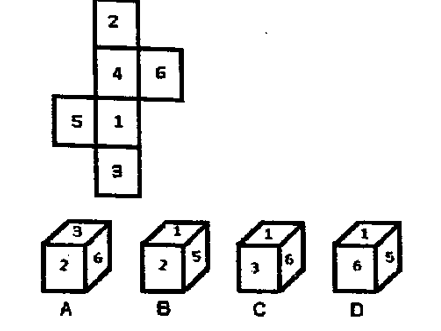
Question 7:
which of the following statements is correct?
दी गई जानकारी के आधार पर, निम्न में से कौन सा कथन सही है ?
सात सहेलियां - प्रणवी, विनीता, रूपा, सौम्या, भावना, उर्मिला और आरोही, वृत्ताकार स्थिति में केंद्र की ओर मुख करके बैठी हैं। आरोही, सौम्या के बाईं ओर दूसरे स्थान पर है तथा भावना और उर्मिला की पड़ोसी है। सौम्या, रूपा या भावना की पड़ोसी नहीं है। प्रणवी, विनीता और रूपा की पड़ोसी है ।
Question 8:
Arrange the following words according to the alphabetical order of the English dictionary-
अंग्रेजी शब्दकोश वर्णक्रम के अनुसार निम्नलिखित शब्दों को व्यवस्थित करें-
1. Master 2. Marvel
3. Market 4. Marker
5. Marble
6. Margin
Question 9:
The order of folding a piece of paper and the way of cutting the folded paper are shown in the following figures. How will the given figures appear when opened.
कागज के एक टुकड़े को मोड़ने का क्रम और मुड़े हुए कागज के काटे जाने का तरीका निम्नलिखित आकृतियों में दिखाया गया है। दी गई आकृतियों को खोले जाने पर यह कैसा दिखाई देगा।
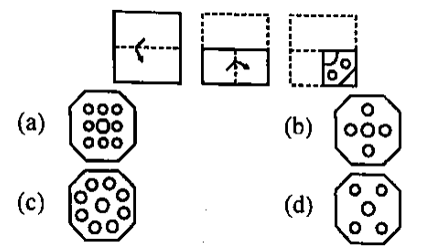
Question 10:
Choose the option in which the numbers of the set share the same relationship as shared by the numbers in the given set. (Note: Operations should be performed on whole numbers without breaking the numbers into their constituent digits. Example: Operations on 13-13 such as addition/ subtraction/multiplying 13 etc. can be performed. Separating 13 into 1 and 3 and then performing mathematical operations on 1 and 3 is not allowed.)
उस विकल्प को चुनिए जिसमें समुच्चय की संख्याएँ वही संबंध साझा करती हैं जो दिए गए समुच्चय में संख्याओं द्वारा साझा किया गया है। (ध्यान दें: संख्याओं को उनके घटक अंकों में अलग अलग किए बिना, पुर्ण संख्याओं पर संक्रियाएँ की जानी चाहिए। उदाहरण 13-13 पर संक्रियाएँ जैसे 13 को जोड़ना / घटाना / गुणा करना आदि किया जा सकता है। 13 को 1 एवं 3 में अलग करने की और फिर 1 एवं 3 पर गणितीय संक्रियाएँ करने करने की अनुमति नहीं है )
(57, 100, 314) (69, 80, 298)

